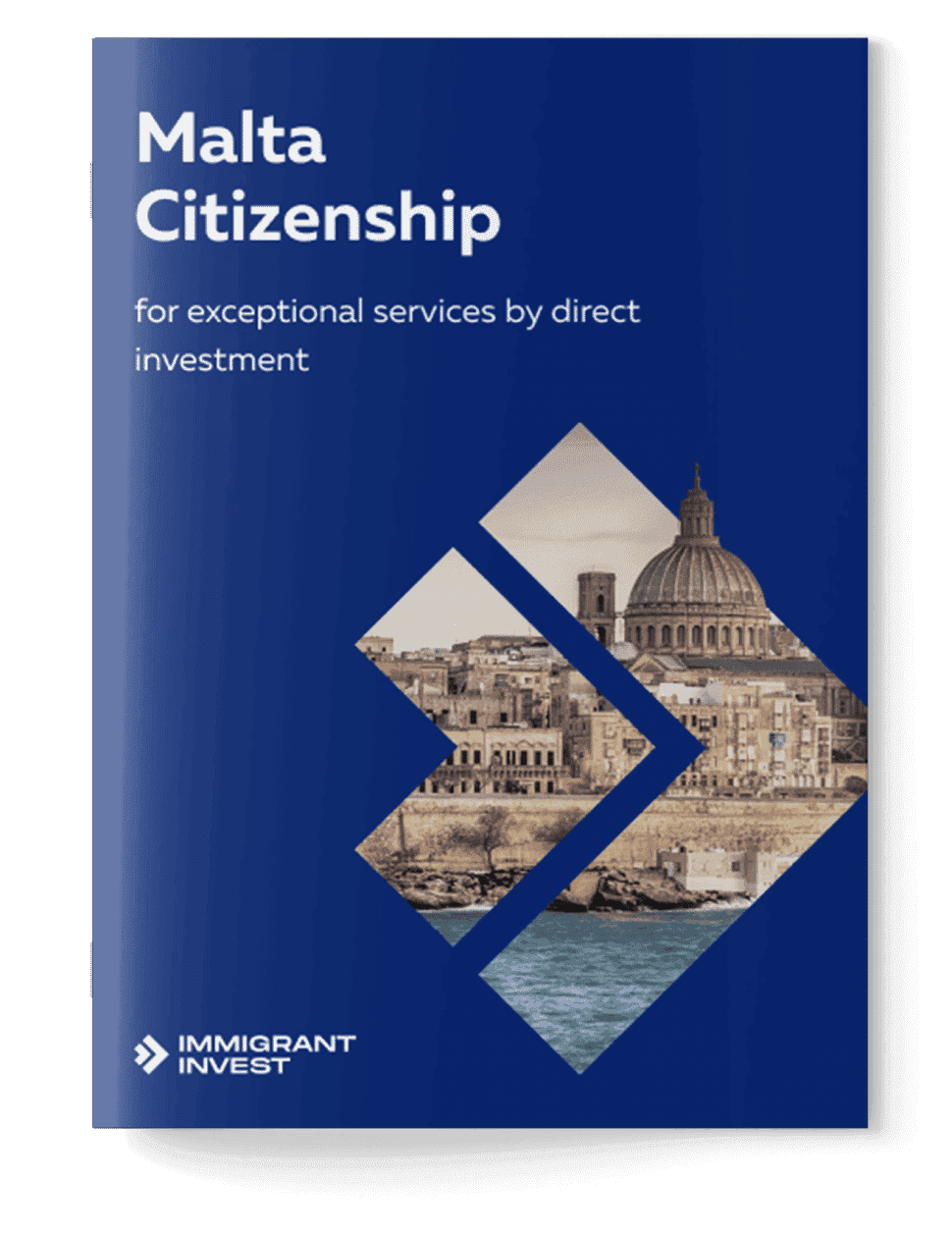Benefits and disadvantages of obtaining Malta citizenship
The Maltese legislation allows applying for citizenship by naturalisation for exceptional services by direct investment. This way, an investor can apply for a passport in one or three years instead of the usual five years of residence.
A Malta passport obtained by naturalisation for exceptional services comes with numerous advantages, such as the ability to move to Malta or stay for a long time in another EU state, travel to 180+ countries visa-free and other perks that can benefit an investor.
Let’s review each benefit and find out if the Malta passport suits your investment and immigration needs.

Author •Julia Loko
Listed the benefits and disadvantages of a Malta passport for investors

Benefits and disadvantages of obtaining Malta citizenship
Malta citizenship benefits for investors
Moving to Malta or another EU country. Investors get a right to live in Malta — a developed country with high quality of life. Also, they can move to any EU country without a visa and stay there as long as they wish.
Travelling to 180+ countries without visas, including the UK, Australia, Canada, and the USA, is available to Malta passport holders.
An opportunity to change tax residency. While investors don’t get any incentives, the Maltese tax system itself can still be beneficial for them in comparison to that of their country of origin. For example, shareholders of Maltese companies can return up to 100% of the corporate tax.
Doing business or working in Europe. Citizens of Malta don’t need to obtain special residency or work permits to get employed or start a business in any EU member country.
Education for children. Сhildren of Malta citizens get the right to study in schools and universities in Malta and all over the EU without student visas. Moreover, the tuition fees are usually significantly lower for them than those for students from non-EU countries. For instance, at Portuguese universities, Malta citizens don’t have to pay tuition fees.
A right to come to Malta at any time, even if the borders are closed to foreigners. After they acquire their passports, investors are not obliged to stay in Malta permanently, but they have the right to enter the country whenever they want. This opportunity can be helpful in case of political or economic turmoil or danger in the country of living.
High-quality healthcare. Maltese passport holders have access to quality Maltese healthcare. The country ranks among the top 30 countries worldwide for quality healthcare, with rates higher than the USA or Israel.
Citizens of Malta have the right to receive medical treatment in any EU country, Iceland, Liechtenstein, Norway, Switzerland and the UK, on the same conditions as the residents insured in that state. This benefit is provided by the European Health Insurance Card (EHIC), available to any EU citizen.
High level of security. Malta is a safe place to live and raise a family. It’s in the top 20 safest countries in the world, according to research by the insurance company Insurly. Creators of the study evaluate several criteria, such as frequency of natural disasters, quality of medicine, risk of terrorism, number of crimes and number of road accidents.
A study by Eurostat found that in terms of the number of crimes, Malta is safer than Denmark, Ireland and the Netherlands. The average number of police-reported crimes per hundred thousand inhabitants in Malta is almost twice as low as in Europe in general.
Finally, Malta is the safest in Europe and the second-safest country for women in the world, according to the Global Wealth Migration Review, a report by New World Wealth that covers wealth migration trends. Women in Malta are at a lower chance of becoming a victim of assault than in any other European country.
Clean country environment. Malta is actively participating in the European New Bauhaus initiative. This new project is about how people can better live together in the post-pandemic environment, respecting the planet and protecting the environment.
The Maltese government has developed strategies to transition to a green economy. Malta has invested in a wastewater treatment process at a sewage treatment plant, which has improved the quality of the seawater around the Maltese Islands. Malta’s seashore is considered one of the best in Europe. Local beaches are awarded Blue Flags every year.

The Golden Bay beach is one of the most popular sandy beaches on the island of Malta. The Blue Flag season starts in mid-July and ends in mid-September
Citizenship for close family members. Investors who obtain citizenship of Malta by naturalisation for exceptional services by direct investment can include their close family members in the application. Here’s who can obtain residency and then citizenship along with the investor:
investor’s spouse or registered partner, including those in same-sex couples;
unmarried and principally dependent children of the investor or their spouse up to 29 years old, including those from previous marriages;
parents and grandparents of the investor and their partner who are older than 55 years old and principally dependent on the investor.
Profitable investment in Maltese real estate. Applicants are required to fulfil several investment conditions to obtain citizenship. One of them is purchasing or renting real estate in Malta. In case of purchase, the investor will be able to return that part of the investment, which is €700,000, after five years of citizenship.
Many investors keep the Maltese real estate and get income from rent. In prestigious areas, it is about 5% per annum. At the same time, the real estate cost grows by 3—5% per annum: an object for €700,000 may cost €850,000 in five years.
An investor can rent an apartment or a house instead of buying it. In the case of rent, their costs for five years will be €80,000. That’s more affordable — the investment amount is about ten times smaller than purchasing the property. On the other hand, the money spent on rent is not possible to return.
Renting takes a couple of weeks, and a purchase and sale transaction takes three months.
After five years of citizenship, an investor can purchase or rent any property in Malta without regard to requirements for its value.
Disadvantages of Malta citizenship
Long waiting. Investors wait to get Malta citizenship for at least 14 months. But there is a benefit that an investor receives a residency card almost immediately — in two weeks. It allows them to travel in the Schengen Area without a visa. At the same time, a countdown for obtaining citizenship starts.
High expenses. Obtaining Malta citizenship requires about €1 million for a family.
The benefit is that the investment conditions are fulfilled only after the approval of the citizenship application. In comparison, in Austria, applicants must invest €10 million in the country’s economy, and they can get citizenship only after two or three years. The investment is made, but the result is not guaranteed.
Non-refundable investment. Most of the investment for obtaining Malta citizenship is non-refundable. These are a contribution to a state fund and a charitable donation, €760,000 in total if an investor gets citizenship after a year of residency.
In exchange for the expenses, the investors and their family members get a new quality of life, freedom of travelling, and access to international entrepreneurship.
Discover your path to Maltese citizenship
Schedule your online meeting today.

Investment programs expert
Malta citizenship: conditions for investors
From 2020, the Maltese legislation allows wealthy people and their family members to apply for citizenship by naturalisation for exceptional services by direct investment.
Before applying, investors should make sure that they are eligible for the program. It means that they:
are over 18 years old;
have only legal income;
aren’t under sanctions;
don’t have a criminal record;
haven’t had visa denials from countries with visa waiver agreements with Malta.
Along with the investor, their spouse, children, parents and grandparents can also join the citizenship application.
Investors cannot obtain a passport directly by investment. First, they become residents and keep that status for one to three years and only then can they apply for citizenship by naturalisation. Here are the three main conditions applicants must fulfil:
To get and retain a residence permit. It is allowed to apply for citizenship 12 or 36 months after getting a residency card. An investor chooses the period. The shorter the period, the higher the amount of the investment is.
To pass the Due Diligence. Investors and their family members pass the Eligibility Test on their professional, personal and financial history.
To fulfil all of the investment conditions.
Investment for obtaining Malta citizenship
An investor fulfils three investment conditions. It is not allowed to fulfil one or two of them by choice.
1. A contribution to the National Development and Social Fund. Many investors want to get Malta citizenship quicker, so they apply for it after 12 months of residency. In this case, the contribution to the fund is €750,000.
The expenses will be less by €150,000 if an investor applies for citizenship after three years. Regardless of the validity of a residence permit, investors contribute an additional €50,000 for each family member.
2. A fixed charitable donation — €10,000. An investor can choose any non-governmental organisation in charity, culture, sports or science. The charitable donation amount doesn’t depend on the residency period or the investor’s family composition — the main thing is that the donation should not be lower than €10,000.
3. Purchase or renting of real estate. If the investor chooses the purchase, the object’s price in the contract of sale should not be less than €700,000. If they decide to rent, the annual payment should not be less than €16,000. Investment in real estate should be kept in the first five years of citizenship.
The additional costs include conducting the Eligibility Test and other government fees.
The most expensive item of the additional costs is the fee for the Eligibility Test. It costs €15,000 for the main applicant and €10,000 for their relative over 12 years old. If the main applicant has gotten their funds from a sponsor, the sponsor passes the check too — it costs €15,000. The fees for the Eligibility Test are established by Maltese legislation.
We’ve told you about the main peculiarities of obtaining Malta citizenship. If you have some questions left, Immigrant Invest lawyers are ready to answer — you can schedule a meeting online or in our office.
Takeaways on pros and cons of Malta citizenship
Pros. Malta citizenship provides multiple perks to investors that can benefit both their personal and business life. Here’s the list of advantages of a Malta passport:
opportunity to move to Malta or stay for a long time in another EU country;
visa-free entry to 180+ countries, including the UK, Australia, and the USA;
an option to change tax residency;
opportunity to start a business in the EU or get employed there;
a right to come to Malta at any time;
high-quality healthcare;
high level of security;
clean country environment;
protection by the Commonwealth legal systems;
opportunity to include close family members in the citizenship application;
profitable investment in real estate.
Cons. Some of the listed benefits apply to only those citizens who obtained their status by naturalisation for exceptional services by direct investment. While this option provides investors with tons of opportunities, there are also a few drawbacks to take into account:
long wait and high expenses.
high non-refundable costs;
stringent Due Diligence.
Immigrant Invest is a licensed agent for government programs in the European Union and the Caribbean.
Frequently asked questions
Case studies

Malta permanent residence to relocate to a calm EU country and improve English language skills

Visa-free entry to the US and the UK with Malta citizenship

Malta citizenship for a Taiwanese family so that their children get prestige education






















